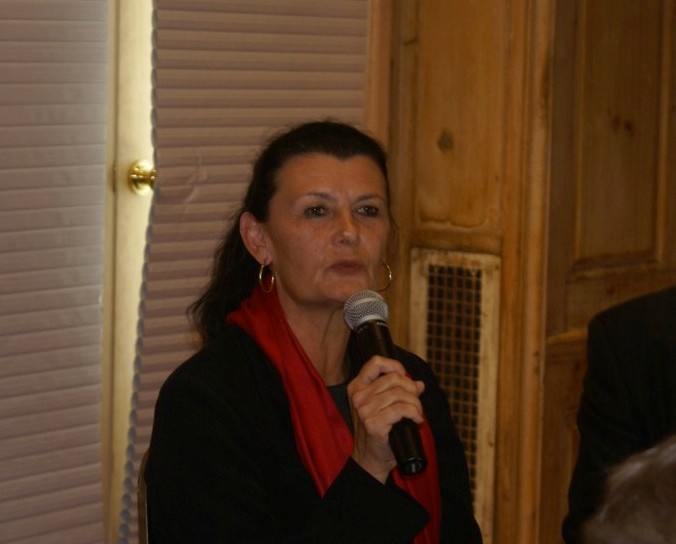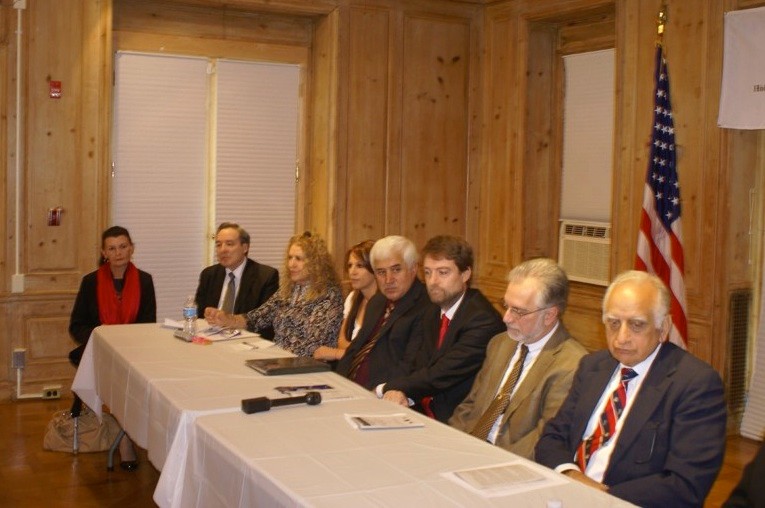Muslim shoah rescuers honored
Includes Muslim woman who made aliyah and converted
When a Muslim family in Yugoslavia protected its Jewish neighbors during the Holocaust, the family had no idea that Israel would rescue them from genocide during the Bosnian War 50 years later. But that is exactly what happened for one Muslim family, and a descendant is now telling her remarkable story, on a visit on Oct. 16 to Glen Cove.
Sara Pechanec, the daughter of Muslim rescuers during the Nazi occupation of Yugoslavia, spoke to a large crowd at the Holocaust Memorial and Tolerance Center of Nassau County in an event coinciding with the BESA: A Code of Honor special exhibit.
Although Pechanec was born after the war, she related the story of how her mother, father and grandfather sheltered a Jewish family, even though the headquarters of the German Gestapo was located across the street from their home. When her grandfather obtained false documents for the Jewish family, they were able to leave Yugoslavia freely. After the Nazis learned that he had assisted Jews, Sara’s grandfather died in a concentration camp.
In the 1990’s, Pechanec lost her home and wealth during the brutal siege of Sarajevo. The Israeli government and Yad Vashem – Israel’s national Holocaust memorial – secured the transit of Sara’s family to the Jewish state in 1994, including her mother, husband, and young daughter. Israeli politicians Yitzhak Rabin and Shimon Peres each delivered letters stating that the Muslim family could remain in Israel for the rest of their lives without conditions.
Now, Pechanec marvels at how kindness and sacrifice can be repaid in successive generations.
“It’s our children and grandchildren that build the bridge of friendship and tolerance and help the people that need help,” she said.
Pechanec said it was hard at first to come to a foreign country. Nevertheless, she wanted to make Israel her permanent home because its people were the only ones willing to help her family when she had no other friends left to turn to. She then made the surprise choice of converting to Judaism. “The rabbis asked me ‘Why do you want to become a Jew? You haven’t enough problems in your life?’” said Sara half-jokingly.
But she was passionate about the Jewish faith. “If you love something and you want to be a part of it, it’s not difficult,” Pechanec said of her desire to convert. In terms of how strict she is in her practice of Judaism, Pechanec describes herself as belonging to the middle of the spectrum – somewhat conservative but not as much one could be. She emphasized that a steadfast belief in G-d should matter more than the different ways in which people express that belief.
Pechanec currently works at Yad Vashem in Jerusalem, and her daughter is an officer in the Israeli Air Force. Pechanec and her siblings represent three countries and three religions, with a Christian brother in Mexico City, and a Muslim sister in Sarajevo.
But her family represents only one of the many cases in which Muslims helped Jews during the Holocaust. Other speakers at the Holocaust Center on Sunday included Qemal Biçaku, a descendant of Albanian Muslim rescuers who saved 26 Jews. After the war, Biçaku’s grandfather and uncle were jailed and tortured by Albania’s strict communist regime for maintaining contact with those Jews who had since settled in other countries. Israel’s Yad Vashem awarded the title of Righteous Among the Nations to both Pechanec’s and Biçaku’s families, which is an honor bestowed upon non-Jewish Holocaust rescuers.
Dr. Anna Kohen, the daughter of rescued Albanian Jews and the President of the Albanian American Women’s Organization, also spoke at the event. Her parents fled to a nearby Muslim village, where they were sheltered in a Muslim home and took on Muslim names until the end of the war. Even though Dr. Kohen says everyone in the village knew her parents were Jewish, no one ever informed the Germans of their presence.
In Albania, the term for helping strangers in need, even at the risk of one’s own family, is known as Besa. In Albania, Besa is a tradition and code of conduct that transcends differences such as religion and ethnicity.
Ferit Hoxha, the Albanian ambassador to the United Nations, described the importance of Besa in Albania’s culture. There was no history of anti-Semitism in Albania before the war, and all of the Jews there survived the Holocaust. Albania was the only country in Europe that had Jewish population growth during the war, as many Jews fled there in order to escape persecution.
Hoxha said that one reason why more people aren’t aware of the rescue of Jews is because Albanians who practice Besa don’t feel that they have done anything out of the ordinary. “They were not looking for attention, they just behaved as their code of conduct, education, and humanity dictates.” Another reason cited by Hoxha is the long post-war period of communist rule, which isolated Albania and forced its citizens to keep quiet about their past.
Dr. Faroque Khan, a founding member of the Islamic Center of Long Island, introduced some of the Albanian Muslims at the event. He said the same principles of Besa also exist throughout the Muslim world and have their origins in the Quran. “This is true jihad. They were practicing the tenets of the Muslim faith.”

 50.0°,
Overcast
50.0°,
Overcast 







